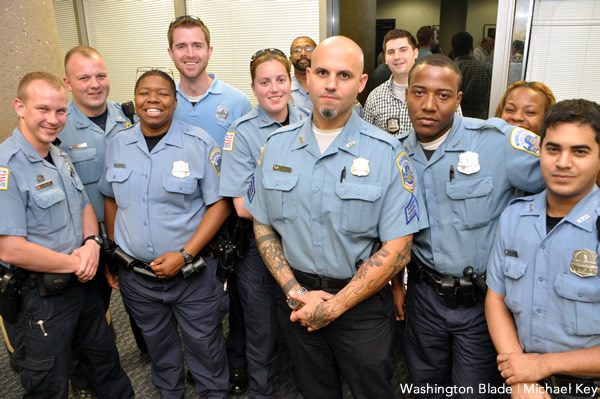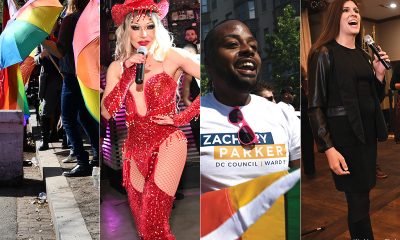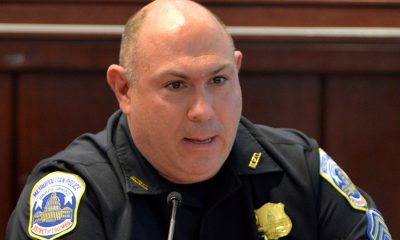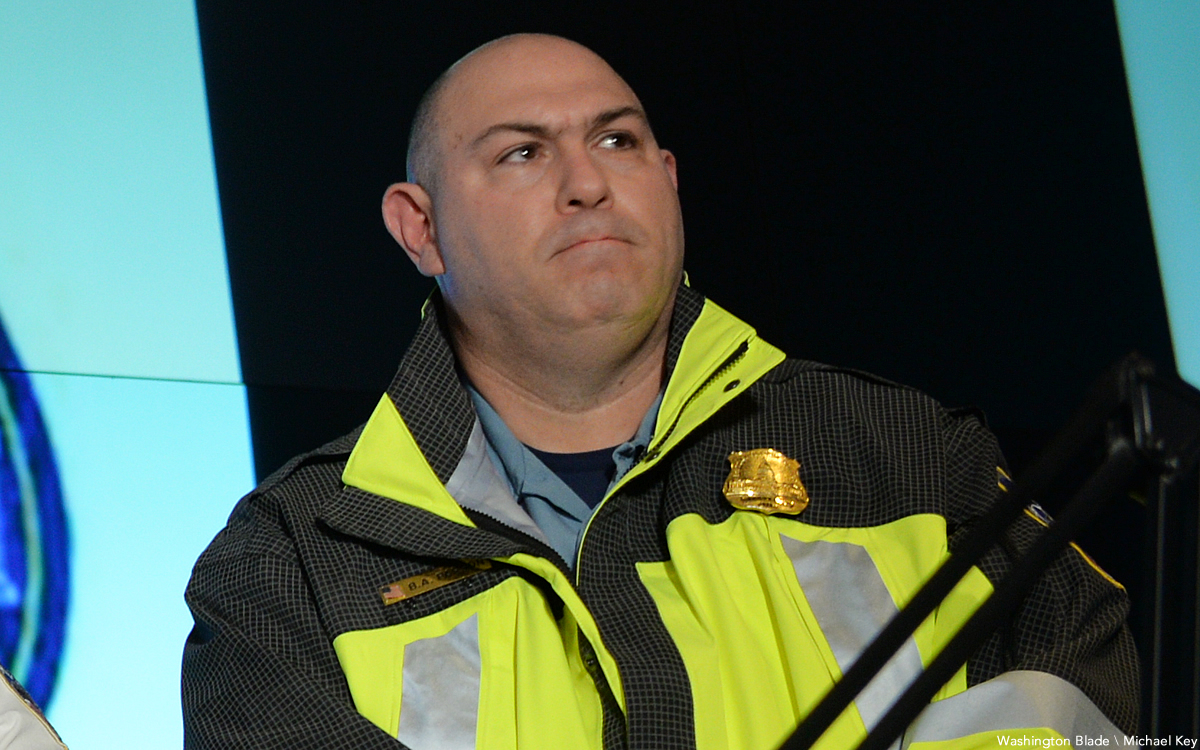Local
UPDATE: GLLU gets temporary new sergeant
Mahl ‘rotating through as part of his training’

A sergeant from the D.C. Police Department’s Sixth District began work on July 1 as supervisor of the department’s Gay and Lesbian Liaison Unit as part of a three-month training program and will return to the Sixth District upon completion of the program, according to a police spokesperson.
Earlier reports from police sources, now said to be incorrect, indicated that Sgt. Matthew Mahl would become the new permanent supervisor of the GLLU, marking the first time the unit has had a full-time supervisor assigned exclusively to the unit since 2009.
“Sergeant Mahl is an affiliate member [of the GLLU] and he is rotating through as part of his training,” Police Chief Cathy Lanier said on Friday in an email to gay activist Peter Rosenstein.
In a separate email, police spokesperson Gwendolyn Crump told the Blade, “Sgt. Mahl is an affiliate and like every member who attends affiliate training, he is rotating through and will return to his assigned element at the end of his detail.”
Lanier told the Blade in an interview last week that GLLU affiliate members are detailed to the GLLU headquarters in Dupont Circle for a 90-day training period before being rotated back to their regular assignment in one of the department’s seven districts.
Some local LGBT activists have urged Lanier to appoint a full-time sergeant to head the GLLU instead of retaining the unit’s current status of being headed by a sergeant who divides his duties between the GLLU and the department’s Latino Liaison Unit.
Since 2009, Sgt. Carlos Mejia has served as supervisor of both the GLLU and the Latino Liaison Unit. He has been praised by LGBT activists who say he has been doing an excellent job.
But the activists, including leaders of the local group Gays and Lesbian Opposing Violence (GLOV), have said the liaison units would be better served – as they had in past years – with a full-time sergeant assigned exclusively to each of the units, including the GLLU.
“I’m glad that Sgt. Mahl is rotating through the GLLU for training but we are still hoping that previous commitments from the chief and the mayor will secure a fulltime permanent sergeant for the unit,” Rosenstein said on Friday.
In her email to the Blade, Crump said Mejia and Sgt. Kenny Temsupasiri are permanently assigned to the Special Liaison Division, which oversees the GLLU, the Latino Liaison Unit and two other special units — the Asian Liaison Unit and the Deaf and Hard of Hearing Liaison Unit.
Temsupasiri heads both the Asian and Deaf and Hard of Hearing Units.
Mahl told the Blade on Thursday that during his tenure at the Special Liaison Division he would serve as full-time supervisor of the GLLU and Mejia would serve exclusively as the Latino Liaison Unit’s supervisor.
“He’s helping me out getting things settled down here,” Mahl said of Mejia.
Capt. Edward Delgado, who heads the Special Liaison Division, sent an email on Thursday to LGBT advocates and various LGBT organizations announcing Mahl’s assignment at the GLLU.
“I would like for each of you to introduce yourself and inform him of the services that each of your organizations provide the community,” Delgado said in his email. “I know that he has been out in the community conducting meet and greet sessions. Therefore, let’s give Sgt. Mahl a warm welcome and support him while he is detailed to the Special Liaison Division,” he said.
Mahl said he has been on the police force for eight and a half years. He began as an officer assigned to the Third District and was assigned to the Sixth District shortly after being promoted to sergeant in 2009.
He said he’s looking forward to working with the LGBT community during his tenure as a GLLU supervisor.
Original post below:
A sergeant from the D.C. Police Department’s Sixth District has been named supervisor of the department’s Gay and Lesbian Liaison Unit, marking the first time the unit has had a full-time supervisor assigned exclusively to the unit since 2009.
Sgt. Matthew Mahl has replaced Sgt. Carlos Mejia, who had been serving as supervisor of both the GLLU and the Latino Liaison Unit.
LGBT activists, while praising Mejia for his work at the GLLU, have long called on police officials to name a sergeant to head the GLLU who spends all of his or her time assigned to the unit.
But the head of the police division that oversees the GLLU and three other special police liaison units, Capt. Edward Delgado, suggested in an email sent to LGBT activists on Thursday that Mahl’s assignment with the GLLU could be short-lived.
“I would like to welcome Sergeant Matthew Mahl who is an Affiliate Sergeant from the Sixth District,” Delgado said in his email. “He is detailed to the unit to get a better understanding of GLLU operations and requirements…Therefore, let’s give Sergeant Mahl a warm welcome and support him while he is detailed to the Special Liaison Division.”
A police spokesperson couldn’t immediately be reached to determine whether Mahl’s tenure at the GLLU is consider permanent or temporary.
The Special Liaison Division oversees the GLLU as well as the Latino Liaison Unit, the Asian and Pacific Islander Liaison Unit, and the Deaf and Hard of Hearing Liaison Unit.
Mahl said Mejia, who is helping him “get on the ground running” at the GLLU, will remain as head of the Latino Liaison Unit.
“The plan is for him to just take over full time the Latino Liaison and myself the Gay and Lesbian Liaison,” Mahl told the Blade on Thursday. “He’s helping me out getting things settled down here.”
Former D.C. Police Chief Charles Ramsey created the GLLU in the late 1990s as one of the first such units in a large metropolitan police department to be given full authority to make arrests and investigate crimes as well as reach out to the LGBT community.
Current D.C. Police Chief Cathy Lanier expanded the GLLU and the other three liaison units over the past four years to include dozens of affiliate officers assigned to each of the department’s seven police districts.
The GLLU affiliate officers, who receive training on LGBT related issues, respond to calls in their respective districts on matters such as anti-LGBT hate crimes or LGBT related domestic violence.
The GLLU’s headquarters in Dupont Circle currently includes five full-time “core” officers along with Mahl as supervisor. An aide to Lanier said last week that there are currently 99 GLLU affiliate officers based in the seven police districts.
Sgt. Brett Parson served as full-time supervisor of the GLLU from 2001 to 2007, receiving praise from LGBT activists for having a highly visible presence in the community. Parson served as head of the then Special Liaison Office, which oversaw the GLLU and the other three liaison units, between 2007 and 2009.
In 2009 Parson also took on the role of GLLU head after his replacement, Sgt. Tania Bell, left the unit. Later that year Parson requested a transfer to a street patrol position, saying his first love as a cop was to focus more on active crime-fighting duties. It was at that time that Lanier assigned Mejia to serve as supervisor of the GLLU while retaining his existing post as supervisor of the Latino Liaison Unit.
Lanier said that due to city budget cuts and police spending constraints, it became necessary to assign Mejia to take on the dual role of supervisor of both units.
The two other special liaison units – the Asian Pacific Islander Liaison Unit and the Deaf and Hard of Hearing Liaison Unit – retained a full-time sergeant serving as supervisor.
Mahl said he was approached about taking on the role as head of the GLLU by Deputy Police Chief Diane Groomes and Delgado.
He said he has been on the force for eight and a half years. He said he began as an officer in the Third District and was promoted to sergeant in 2009 before being assigned to the Sixth District. Mahl said he looks forward to his duties with the GLLU and will be meeting with LGBT advocates and various LGBT organizations over the next few weeks.
“I don’t know how long these things last, but I’m here for now,” he said, when asked whether he was told how long his detail with the GLLU would last.
As of Thursday, the department had not issued an official announcement of Mahl’s assignment to the GLLU.
A.J. Singletary, chair of Gays and Lesbians Opposing Violence (GLOV), which monitors police related issues, said he was unaware of Mahl’s assignment as GLLU head until the Blade contacted him about the development.
“I think it’s great,” he said. “Having someone talking on this role is something we have been asking for and the community has been asking for. GLOV has always called for having a full-time sergeant.”
District of Columbia
Two charged with assaulting, robbing gay man at D.C. CVS store
Incident occurred after suspects, victim ‘exchanged words’ at bar

D.C. police just after 1 a.m. on April 10 arrested two men for allegedly assaulting and robbing a gay man inside a CVS store at 1418 P St., N.W., according to a police report and charging documents filed in D.C. Superior Court.
The charging documents state that the alleged assault and robbery occurred a short time after the three men “exchanged words” at the gay bar Number 9, which is located across the street from the CVS.
The arrested men are identified in the charging documents as Marquel Jose Diaz, 27, of Northwest D.C., and Lorenzo Jesse Scafidi, 21, of Elizabeth City, N.C. An affidavit in support of the arrest for Diaz says Diaz and the victim “were previously in a relationship for a year.”
Court records show Diaz was charged with Simple Assault, Theft Second Degree, and Possession of a Controlled Substance. The court records show the controlled substance charge was filed by police after Diaz was found to be in possession of a powdered substance that tested positive for cocaine.
Scafidi was charged with Simple Assault and Theft Second Degree, the court records show.
The D.C. police report for the incident does not list it as a suspected hate crime.
The court records show both men pleaded not guilty to the charges against them at a Superior Court arraignment on the day of their arrest on April 10. The records show they were released by a judge while awaiting trial with an order that they “stay away” from the victim. They are scheduled to return to court for a status hearing on May 21.
The separate police-filed affidavits in support of the arrests of both Diaz and Scafidi each state that the two men and the victim “exchanged words” inside the Number 9 bar. The two documents state that both men then entered the CVS store after the victim went to the store a short time earlier.
Scafidi “came into the CVS shortly after and entered the candy aisle and slammed Complainant 1 [the victim] to the ground causing Complainant 1’s phone to fall out of CP-1’s pocket,” one of the two affidavits says. It says Scafidi “again picked up CP-1 and slammed him to the ground.”
The affidavit in support of Diaz’s arrest says Diaz also followed the victim to the CVS store after words were exchanged at the bar. It says that after Scafidi allegedly knocked the victim down in the candy aisle Diaz picked up the victim’s phone, “swung on” the victim “while he was still on the ground,” and picked up the victim’s watch before he and Scafidi fled the scene.
Without saying why, the two arrest affidavits say Diaz and Scafidi returned to the scene and were arrested by police after the victim and at least one witness identified them as having assaulted and robbed the victim.
Attorneys representing the two arrested men did not respond to phone messages from the Washington Blade seeking comment and asking whether their clients dispute the allegations against them.
The victim also did not respond to attempts by the Blade to obtain a comment from him. The police report says the victim is a resident of Fairfax, Va.
District of Columbia
Bowser calls for ‘extraordinary’ response to reduction in D.C. budget
Impact on city funding for LGBTQ programs and grants unclear

D.C. Mayor Muriel Bowser on April 15 issued an executive order calling for “extraordinary actions,” including “significant cuts in District Government services,” to address a decision by Congress to cut the city’s current budget by $1.1 billion.
The nine-page executive order points out that these actions became necessary after the U.S. House of Representatives has so far declined to vote on a free-standing bill approved by the U.S. Senate last month that would restore the $1.1 billion D.C. budget cut initially approved by the House.
In addition to large-scale cuts in city services, the mayoral order says the congressionally imposed city budget cut will bring about city “hiring freezes, financial impacts to employees, reductions and terminations in contracts and grants, and closures of District Government facilities.”
The order adds, “These are unprecedented actions given that the District itself adopted and is able to implement a fully balanced budget, but they are necessary due to the Congressional cut to the District’s budget and its inaction in timely fixing its legislative error.”
The House adjourned this week on a recess until the end of April, and congressional observers say it is unclear whether the majority Republican House will take up the Senate bill to undo the D.C. budget cut when the House returns from its recess. President Donald Trump has called on the House to approve the bill to restore the full D.C. budget.
Among the D.C. LGBTQ organizations and those providing services to the LGBTQ community that receive D.C. government funding and that could be impacted by the budget cuts are Capital Pride Alliance, which is organizing WorldPride 2025 set to take place in D.C. next month; and Whitman-Walker Health, one of the city’s largest private healthcare organizations that provides medical services for LGBTQ clients.
Also receiving city funding are the Wanda Alston Foundation, which provides housing services for LGBTQ people; and the LGBTQ youth advocacy and services organization SMYAL.
Spokespersons for the four organizations couldn’t immediately be reached to determine if they knew whether the soon-to-be implemented budget cuts would have an impact on the city funding they currently receive.
In response to questions from news reporters during an April 15 press conference call to discuss the Bowser executive order, Jenny Reed, director of the D.C. Office of Budget and Performance Management, said details on specific programs or funding allocations set to be cut would not be known until the mayor submits to the D.C. Council her Supplemental FY 2025 budget along with her proposed FY 2026 budget.
Reed was joined at the press briefing by Lindsey Parker, Mayor Bowser’s chief of staff; and Tomas Talamante, director of the Office of Intergovernmental Affairs.
They and other city officials have said the impact of the congressionally imposed city budget cut was expected to be lessened but remain highly problematic by Bowser’s decision to invoke a 2009 law that allows the city to increase its own spending without approval by Congress under certain circumstances.
The mayor has said under that law, the city would need to cut its FY 2025 budget by $410 million rather than by $1.1 billion. It couldn’t immediately be determined whether House Republicans, who initiated the requirement that the D.C. budget be cut by $1.1 billion, would challenge the mayor’s plan to invoke the 2009 law to reduce the size of the budget cut.
“Without the ability to fully execute the Fiscal Year 2025 budget as adopted and approved by the District, this gap will force reductions in critical services provided by our largest agencies, including the Metropolitan Police Department and the Fire and Emergency Medical Services Department,” the mayor’s executive order states.
“The District will continue to work with members of the House of Representatives to urge them to vote to fully restore the District’s Fiscal year 2025 budget and will continue to work with President Trump to strongly encourage the House of Representatives to take that action,” the order says.
District of Columbia
LGBTQ budget advocates fight for D.C. resources in a tough fiscal year
‘Trying to preserve life-saving services’ amid $1 billion cut

The months and days leading up to June are especially busy for LGBTQ Washingtonians. For one group, the DC LGBT Budget Coalition, which works year-round to ensure LGBTQ residents are represented and financially supported by the D.C. government, this time of year is their Super Bowl. Beginning in April, the D.C. Council and Mayor’s Office hold budget hearings for the next fiscal year.
With D.C.’s budget now under review, the Washington Blade spoke with Heidi Ellis, coordinator of the DC LGBT Budget Coalition, about the group’s top priorities and their push to ensure continued support for queer communities.
“The LGBTQ Budget Coalition was founded in 2020 at the height of the pandemic, as a way for the community to work together to advocate for key funding and policy changes,” Ellis said. “We recognized we were stronger together. A lot of groups are often pitted against each other for resources and dollars. This coalition was founded out of a need for unity. Since then, we’ve successfully advocated for more than $20 million in dedicated LGBTQ investments.”
In addition to coordinating the coalition, Ellis is the founder and CEO of HME Consulting & Advocacy, a firm that helps build coalitions and advance policy initiatives that address intersectional issues in the LGBTQ community. One of its most powerful tools, she explained, is direct outreach through community surveys.
“We actually do community surveys to see what people need and what’s top of mind,” Ellis said. “Of course, we also pay attention to the broader political landscape — like the current threats to HIV funding. That helps us prioritize.”
Because the coalition is comprised of more than 20 organizations across various sectors —healthcare, housing, community organizing — Ellis said its diversity enables it to connect grassroots needs to potential policy solutions.
“Our coalition includes service providers, community groups, health and housing advocates-folks who are deeply plugged into what’s happening on the ground,” she said. “They help determine our direction. We know we don’t represent every queer person in D.C., but our coalition reflects a wide range of identities and experiences.”
The insights gathered through those surveys ultimately inform the coalition’s annual budget proposal, which is submitted to the Council and mayor.
“That’s how we got to our FY26 priorities,” she said. “This year, more than ever, we’re fighting to protect what we’ve already secured — funding and policies we’ve had to fight for in the past. We know there’s concern around this budget.”
One of the challenges this year is that the D.C. government’s operating budget and some of its legislation must be approved by Congress. With a projected decline in tax revenue and a Republican-controlled Congress that has historically opposed LGBTQ funding, the Coalition has had to think strategically.
“Even before the situation on the Hill, the CFO projected lower revenue,” Ellis said. “That meant cuts to social programs were already coming. And now, with the $1 billion slashed from D.C.’s budget due to the continuing resolution, we’re not only fighting for D.C.’s budget and autonomy, but also trying to preserve life-saving services. Our message is simple: Don’t forget about queer people.”
This year’s proposal doesn’t include specific dollar figures. Instead, the Coalition outlines five funding priority areas: Healthcare, Employment & Economic Equity, Housing, Safety & Community Support, and Civil Rights.
Why no exact amounts? Ellis said it’s because not all solutions are financial.
“Some of our asks don’t require new funding. Others build on existing programs-we’re asking whether the current use of funds is the most effective. We’re also proposing policy changes that wouldn’t cost extra but could make a real difference. It’s about using what we have better,” she said.
When drafting the proposal, the Coalition tries to prioritize those with the most pressing and intersecting needs.
“Our perspective is: If we advocate for the most vulnerable, others benefit too,” Ellis said. “Take LGBTQ seniors. Some may have done well in life but now face housing insecurity or struggle to access affordable healthcare. Many in our coalition are elders who fought on the frontlines during the AIDS epidemic. They bring critical historical context and remind us that Black and brown communities bore the brunt of that crisis.”
“I love our coalition because it keeps us accountable to the moment,” she added. “If we center those most marginalized, we can make an impact that lifts everyone.”
In addition to healthcare and housing, safety remains a top concern. The Coalition has fought to maintain funding for the Violence Prevention and Response Team (VPART), a city-supported group that includes MPD, community-based organizations, and the Mayor’s Office of LGBTQ Affairs. VPART responds to crimes affecting the LGBTQ community and connects victims to legal, healthcare, and housing services.
“We’ve pushed to make VPART more proactive, not just reactive,” Ellis said. “The funding we’ve secured has helped survivors get the support they need. Cutting that funding now would undo progress we’re just beginning to see.”
At the end of the day, Ellis emphasized that this process is about far more than spreadsheets.
“A budget is a moral document,” she said. “If we’re not represented, you’re telling us our lives don’t matter at a time when we need protection the most. When people can’t get food, medicine, housing — that has a devastating impact. These are vital services.”
The DC LGBT Budget Coalition is urging residents to support a letter-writing campaign to D.C. Council members and the mayor. You can send a letter here: https://actionnetwork.org/letters/fully-fund-dcs-lgbtq-communities
Read the full FY26 budget proposal here: https://drive.google.com/file/d/1bTrENnc4ZazJTO6LPrQ3lZkF02QNIIf1/view
-

 District of Columbia2 days ago
District of Columbia2 days agoReenactment of 1965 gay rights protest at White House set for April 17
-

 Hungary2 days ago
Hungary2 days agoHungarian MPs amend constitution to ban public LGBTQ events
-

 Maryland2 days ago
Maryland2 days agoFreeState Justice: Transgender activist ‘hijacked’ Moore’s Transgender Day of Visibility event
-

 Real Estate3 days ago
Real Estate3 days agoNavigating DMV real estate market during political unrest












